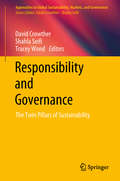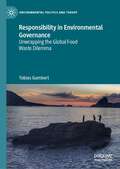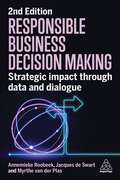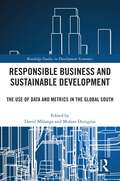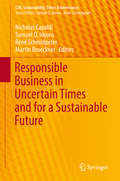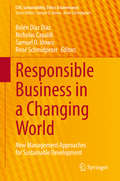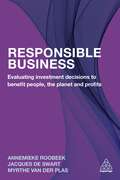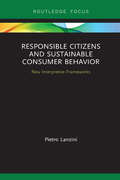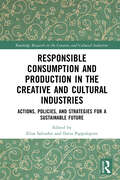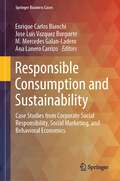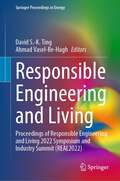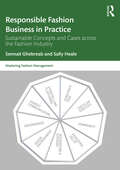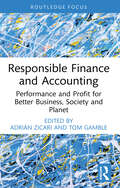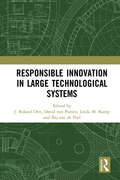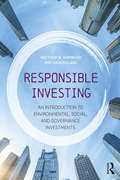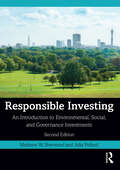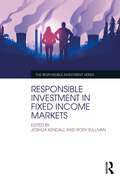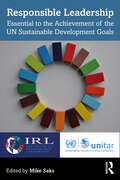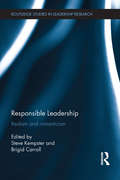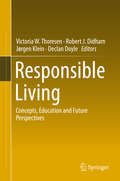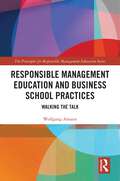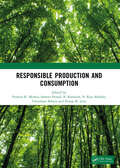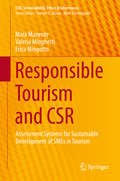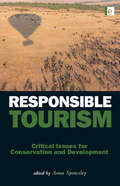- Table View
- List View
Responsibility and Governance: The Twin Pillars of Sustainability (Approaches to Global Sustainability, Markets, and Governance #8)
by David Crowther Shahla Seifi Tracey WondThis book examines various aspects of changes to business behavior through the lenses of the “twin pillars” of sustainability – responsibility and governance. It discusses whether the focus of corporate social responsibility has changed so much that we need to think about redefinitions of key concepts in the field, and analyses both the theory and practice in a variety of ways to enable conclusions to be drawn about the changes needed to any definitions.This approach is based on the tradition of the Social Responsibility Research Network, which in its 15-year history has sought to broaden the discourse and to treat all research as inter-related and relevant to business. This book consists of the best contributions from the 16th International Conference on Corporate Social Responsibility and 7th Organisational Governance Conference held in Derby, United Kingdom in August/September 2017.
Responsibility in Environmental Governance: Unwrapping the Global Food Waste Dilemma (Environmental Politics and Theory)
by Tobias GumbertThis book provides a comprehensive study of the notion of responsibility in environmental governance. It starts with the observation that, although the rhetoric of responsibility is indeed all-pervasive in environmental and sustainability-related fields, decisive political action is still lacking. Governance architectures increasingly strive to hold different stakeholders responsible by installing accountability and transparency mechanisms to manage environmental problems, yet the structural background conditions affecting these issues continue to generate unevenly distributed, socially unjust, and ecologically devastating consequences. Responsibility in Environmental Governance develops the concept of responsibility as an analytical approach to map and understand these dynamics and to situate diverse meanings of responsibility within larger socio-political contexts. It applies this approach to the study of food waste governance, uncovering a narrow governance focus on accountability, optimization, and consumer behavior change strategies, opening up spaces for organizing more democratic solutions to a truly global problem.
Responsible Business Decision Making: Strategic Impact Through Data and Dialogue
by Prof. Dr. Annemieke Roobeek Jacques de Swart Myrthe van PlasIn the past, profit was the driving force for most business investment decisions. However, now organizations need to additionally deliver on impact goals. Responsible Business Decision Making provides a practical guide for how organizational leaders can make smart responsible business decisions. It offers a framework that eliminates internal bias, aligns ethical values with business goals and draws on diverse case studies. The book will answer questions such as: how can dialogue and data optimize decision-making? How can ESG goals be translated into concrete manageable actions? Which decisions best suit the strategic objectives of the organization? This new edition has been updated to offer an increased focus on dialogue and data-driven decision making and new coverage on ESG, Sustainable Development Goals (SDGs), digital transformation and the Raworth's Doughnut Economy framework. Readers will benefit from many new international cases covering topics such as ESG investment, SDG impact measurement and sustainability transformation.
Responsible Business and Sustainable Development: The Use of Data and Metrics in the Global South (Routledge Studies in Development Economics)
by David Mhlanga Mufaro DzingiraiResponsible and sustainable business practices are becoming increasingly important in the information age, as companies are realizing the need to address ethical and social issues associated with their operations. In today’s interconnected world, businesses have access to vast amounts of data that can be used to improve their bottom line but can also pose significant risks to individuals and society. At the same time, responsible business practices have the capacity to positively impact international development goals such as poverty alleviation, economic growth, responsible consumption, and health and social welfare.This book presents a transdisciplinary framework for addressing the 2030 Sustainable Development Agenda, offering fresh perspectives from the Global South. It provides an overview of the key challenges and opportunities associated with responsible business practices in the information age, including the need to balance privacy and security concerns with data analytics and innovation. It also highlights some of the best practices and initiatives, such as stakeholder engagement, transparency, and accountability. The book establishes the role of green leadership in promoting responsible production, discusses the importance of measuring and reporting on sustainable innovation, including the use of sustainability metrics and reporting frameworks. Further, it debates the importance of incorporating ethics and sustainability in strategic management practices. It provides a comprehensive understanding of the integration of these values in organizational decision‑making. By delving into the pressing matters that impact our world today, the book generates a sense of urgency and awareness among its audience.Its inclusive approach to exploring various perspectives and opinions invites readers to participate in a constructive dialogue, broadening their understanding and deepening their empathy for different viewpoints.
Responsible Business in Uncertain Times and for a Sustainable Future (CSR, Sustainability, Ethics & Governance)
by Nicholas Capaldi Samuel O. Idowu René Schmidpeter Martin BruecknerThis book offers up-to-date insights into the theory and practice of Corporate Social Responsibility (CSR) and sustainability management. Gathering contributions by a team of international scholars, it shares perspectives from a variety of academic disciplines, including management and tourism as well as accounting, higher education research and supply chain management. Guided by the credo of achieving 'Responsible Business for Uncertain Times and a Sustainable Future,' the authors present their latest reflections on, and possible solutions for, sustainable and responsible business practices. All of the contributions presented here are critical, evidence-based and solution-oriented, making the book both practical and insightful reading for academics and practitioners alike.
Responsible Business in a Changing World: New Management Approaches for Sustainable Development (CSR, Sustainability, Ethics & Governance)
by Nicholas Capaldi Samuel O. Idowu René Schmidpeter Belén Díaz DíazThis book explores the current state of Corporate Social Responsibility (CSR) from an international perspective, the goal being to share ideas and visions for a sustainable future and to provide useful guidelines for academics, practitioners and policymakers in the context of the 2030 “Agenda for Sustainable Development” released by the United Nations. Research on CSR has evolved considerably over the last three decades. However, there are still many unanswered questions concerning the sustainability of business in an increasingly changing world, for example: If most companies consider CSR to be valuable to their organizations, why do only 15% of them systematically implement Social Responsibility initiatives? If CSR has been found to be profitable for companies, why are they so reluctant to develop an active, internal CSR policy? Why are there such significant differences in CSR adoption from country to country? Why does it take a huge crisis to make politicians react and regulate certain core CSR issues? This contributed volume answers these questions, presenting a wealth of case studies and new approaches in the process.
Responsible Business: Making Strategic Decisions to Benefit People, the Planet and Profits
by Annemieke Roobeek Jacques De Swart Myrthe Van PlasUntil recently, profit has been the driving force for most business decisions. However, business leaders must now look more widely at their actions to assess the impact of these on people both inside and outside the organization as well as the environment. Responsible Business provides a seven step framework that eliminates internal bias and can be used to make decisions that increase profits, benefit staff and protect the environment as a whole. This means that personal values, ethics and morals can be aligned with business goals and overall company strategy.Responsible Business will enable business leaders to answer questions including what values should be attached to financial and non-financial aspects of business decisions? How can these values be translated into concrete manageable actions? and which decisions best suit the strategic goals of the organization? Readers will have access to the business simulator tool which removes the complexity, ambiguity and stress of business decisions to allow leaders to manage the competing priorities in their organization and confidently make the best investment decisions for their business. With diverse case studies from organizations who have benefited from this approach, this book is essential reading for everyone needing to evaluate their investment decisions.
Responsible Citizens and Sustainable Consumer Behavior: New Interpretive Frameworks (Routledge-SCORAI Studies in Sustainable Consumption)
by Pietro LanziniThere is broad consensus on the need to shift to a new paradigm of lifestyles and economic development, given the un-sustainability of current patterns. Given this, research on consumer behavior is to play a crucial role in shedding light on the motives underpinning the adoption of responsible behaviors. Stemming from a thorough discussion of existing approaches, this book argues that the perspective of analysis has to be modified. First, acknowledging that a profile of the responsible consumer does not exist since all of us can be more or less sustainable and environment-friendly: the sustainability of an individual should not be considered as given, being something dynamic that changes according to both subjective and contextual factors. Moreover, the book hypothesises that integrating dimensions and perspectives that have been so far overlooked by mainstream research will help deconstruct responsible behaviors adopting a flexible and holistic approach. Relevant policy implications are discussed, and empirical research on responsible behaviors is illustrated. This book will be of great interest to students and scholars of consumer behavior, sustainable consumption, environmental psychology and environmental studies in general.
Responsible Consumption and Production in the Creative and Cultural Industries: Actions, Policies, and Strategies for a Sustainable Future (Routledge Research in the Creative and Cultural Industries)
by Elisa SalvadorNo sector can escape the challenge of the climate crisis. This book brings together a team of academic experts to urgently examine the intersection of sustainability and the Cultural and Creative Industries (CCIs), particularly within the framework of Sustainable Development Goal 12 (SDG 12): Responsible Consumption and Production.Investigating responsible consumption and production across the CCIs, this book explores the role of public policy, funding bodies and other institutional actors in the sustainable transition. It also links CCIs with the development of sustainable tourism and sustainable tourism cities and provides evidence on the role of CCIs in producing positive change in people’s behaviours, consumption patterns, and perceptions of the climate emergency. Transformations towards circular economy models in the CCIs are also analysed. In illuminating how the CCIs’ are embracing the challenge of sustainable development, the chapters in this book highlight best practices and sustainable solutions across a range of geographic and cultural contexts.This book will be a valuable resource for researchers, academics and advanced students with an interest in sustainable business practices, especially their application to the CCIs.
Responsible Consumption and Sustainability: Case Studies from Corporate Social Responsibility, Social Marketing, and Behavioral Economics (Springer Business Cases)
by M. Mercedes Galan-Ladero Enrique Carlos Bianchi Jose Luis Vazquez Burguete Ana Lanero CarrizoThis book presents high-quality cases on the actions carried out by companies to minimize the social and environmental impact of the products (goods and services) they launch on the market. It also highlights the education campaigns that promote behavioral changes and new sustainable lifestyles that have been developed by all kinds of organizations (Public Administration, NGOs, and businesses), mainly from Corporate Social Responsibility, Social Marketing, and Behavioral Economics perspectives. International cases help students learn how management and corporate strategy, and the appropriate marketing strategies, can be designed with an aim to achieve responsible consumption and create sustainable lifestyles.
Responsible Engineering and Living: Proceedings of Responsible Engineering and Living 2022 Symposium and Industry Summit (REAL2022) (Springer Proceedings in Energy)
by David S.-K. Ting Ahmad Vasel-Be-HaghThis book includes the proceedings of the Responsible Engineering and Living 2022 Symposium and Industry Summit. Molière holds each of us accountable when he asserted that, “It is not only for what we do that we are held responsible, but also for what we do not do.” Responsible Engineering and Living 2022 (REAL2022) strived to inspire every individual to practise and foster responsible engineering and living. Its proceedings brings all stakeholders, enthusiasts and experts from academia, industry, policy arenas, and general public, together to discuss challenges, sharpen existing solutions, and formulate novel means to advance responsible engineering and living. This symposium disseminates recent progress and promote collaborations to maximize opportunities for innovative solutions. Topics of interest include resource and energy conservation, waste reduction, nature-friendly engineering and architecture, and sustainable vibrant living.
Responsible Fashion Business in Practice: Sustainable Concepts and Cases across the Fashion Industry (Mastering Fashion Management)
by Sennait Ghebreab Sally HealeThis unique text offers a holistic, insightful and timely exploration of sustainable practices across the fashion industry. The book takes the reader logically through each part of the authors’ new Responsible 9 Framework™, providing a clear perspective and examples for each component. The framework thoroughly explains the move away from a singular product commercial focus to a Conscious Item approach and Circular Services business mindset. An organisation’s people are at the heart of the new framework and have therefore been rebranded as Community. Next addressed is the Perceived Value of an item or brand, and how sustainable pricing initiatives actively influence consumer purchase. Insights into Accountable Systems are reviewed to examine the importance of responsible processes when considering and integrating a successful, sustainable supply chain into a fashion business. The section on Governance looks at the different global organisations available to fashion brands and customers alike, which support their transition into a responsible and sustainable future existence. The last two sections of the framework are labelled Storytelling Platforms and Honest Communication, where transparent and honest strategies are highlighted and discussed from a viewpoint of how modern brands are engaging and connecting to the new conscious consumer. For each of the nine aspects, contemporary case studies from global brands such as Stella McCartney, Zalando and Arc'teryx, alongside insights from current, leading experts within the fashion world, bring the theory to life. Showing how sustainability has been integrated throughout the entirety of the fashion business, this textbook is perfect for advanced undergraduate and postgraduate students Fashion Management, Fashion Brand Management and Fashion Marketing, as well as reflective leaders and practitioners within the industry.
Responsible Finance and Accounting: Performance and Profit for Better Business, Society and Planet (Routledge COBS Focus on Responsible Business)
by Adrián Zicari Tom GambleThe UN Sustainable Development Goals, an increasing interest in Environmental, Social, and Governance factors, the climate crisis, stakeholder pressure, the lessons of corporate scandals, and the COVID-19 pandemic have triggered a massive change in how companies approach finance and accounting practices. From being a ‘nice-to-have’ to becoming a ‘must-have’, Responsible Finance and Accounting positions itself as a key pillar in tomorrow’s better world for business, society, and planet. In this book, leading researchers and practitioners in the field of corporate social responsibility, from the schools and corporate partners of the Council on Business & Society, give you key insights into green finance and social and environmental reporting, national, international and corporate stakes in green taxonomy and carbon tax, and triple capital accounting. It also details how to model effective and low-cost social impact reporting, ethics in finance and accounting, and strategies for microfinance and finance-related social innovation. Each insight is accompanied by key takeaways, food for thought, and micro-case study sections. This accessible book will be a valuable resource for scholars, instructors, and upper-level students across finance and accounting as well as corporate social responsibility and business ethics. It will also serve as a guide for professionals aiming to deepen their understanding of new finance and accounting practice.
Responsible Innovation in Large Technological Systems
by J. Roland Ortt Ibo Van De Poel David Van Putten Linda M. KampLarge technological systems, such as seaports, nuclear power stations, wind farms and natural gas extraction, provide vital functions for society. And yet these large technological systems have an impact on different stakeholder groups in both positive and negative ways. This book defines responsible innovation and describes how both the innovation process and the resulting innovation outcome can be designed, created and implemented in a way that respects the various stakeholder groups involved and affected by the system. Taking a case-based approach, a number of large technological systems are profiled, including hydraulic engineering, nuclear energy, smart metering, and wind power. The values of each of the stakeholder groups, and the costs and benefits of the systems presented, are analysed. The book concludes by combining these insights to provide a framework for how responsible innovation of large technological systems can be implemented in practice. The book will be of particular interest to undergraduate and postgraduate students and researchers in technology and innovation management, and corporate governance, CSR and business ethics.
Responsible Investing: An Introduction to Environmental, Social, and Governance Investments
by Matthew W. Sherwood Julia PollardThis textbook provides the first holistic resource on Environmental, Social, and Governance (ESG) investing for undergraduate and graduate programs. It provides a thorough background and history of ESG investing, as well as cutting-edge industry developments, in a way that introduces the reader to the rapidly developing field of responsible investing. Beginning with a comprehensive background of ESG investing and the development of models measuring risk and return, the book then discusses the development of ESG risks, and provides an overview of ESG rating systems. The textbook also outlines the current position of ESG investing in portfolio management through granular analysis, provides insight into common investor concerns about ESG investments, discloses qualitative theories relevant to ESG investing, and reviews literature attempting to model ESG investment performance. Finally, the authors provide readers with a foundation on the development of financial models measuring risk and return, which will be useful for measuring the performance of ESG investments. With case studies from contributors around the world, this textbook is the first of its kind to truly provide a compelling blend of quantitative and qualitative analysis supporting the incorporation of ESG investment strategies into investment portfolios. Offering an excellent overview of the growing trends in ESG investing, as well as a close analysis of ESG theories and their practical application both today and in the future, this book will be a great resource for both undergraduates and graduate students.
Responsible Investing: An Introduction to Environmental, Social, and Governance Investments
by Matthew W. Sherwood Julia PollardResponsible Investing serves as a holistic resource on Environmental, Social, and Governance (ESG) investing for undergraduate and graduate programs. It provides a thorough background and history of ESG investing, as well as cutting-edge industry developments, introducing the reader to the rapidly evolving field of responsible investing. Building on the first edition, this second edition provides updates where appropriate, as well as new emphasis on the development of standards in terminology and metrics. Opening with the background of ESG investing, the book discusses the development of ESG risks and provides an overview of ESG rating systems. It outlines the current position of ESG investing in portfolio management through granular analysis, offers insight into common investor concerns about ESG investments, presents qualitative theories, and reviews literature modeling ESG investment performance. Finally, the authors provide readers with a foundation on the development of financial models measuring risk and return, which can be used to evaluate the performance of ESG investments. This edition features updated statistics and a new chapter on regulation, reporting, and taxonomy in ESG investing, as well as new international case studies. Following a summary approach, Responsible Investing is a valuable textbook, providing a context in which upper-level students of ESG investment and sustainable finance can specialize.
Responsible Investment in Fixed Income Markets (The Responsible Investment Series)
by Joshua Kendall Rory SullivanThis book provides the world’s first comprehensive account of responsible investment for fixed income investors. It enables readers to understand the key characteristics of fixed income investments and the relevance of sustainability-related issues to fixed income markets. The expert contributors to this volume explain how sustainability-related issues can be taken into account in fixed income research and decision-making, in portfolio construction, and in active ownership (engagement). They provide a series of detailed case-studies from different parts of the fixed income market (corporate investment grade and high yield, emerging markets, sovereign and municipal debt), from a range of organisations with a variety of investment approaches. The contributors also provide in-depth critical analysis of key issues such as the role and influence of credit rating agencies, green bonds, data and public policy in shaping investment practice. For investors, this book provides practical guidance on how to improve the financial and the sustainability performance of their fixed income investments. For stakeholders such as companies, civil society organisations, and governments it allows them to understand the role that fixed income might play in delivering the Sustainable Development Goals (SDGs), and to understand how they might encourage fixed income investors to pay greater attention to sustainability-related issues in their investment practices and processes.
Responsible Leadership: Essential to the Achievement of the UN Sustainable Development Goals
by Mike SaksWith a range of well-respected voices from across the business, political, third sector and research spectrum, this important book provides an accessible insight into responsible leadership. It represents the most comprehensive and informed work on responsible leadership linked to the United Nations (UN) Sustainable Development Goals (SDGs) produced to date. This carefully edited volume, based on a collaborative partnership between the Institute for Responsible Leadership (IRL) and the United Nations Institute for Training and Research (UNITAR), contains twenty chapters in seven parts which address the relationship between responsible leadership and the UN Sustainable Development Goals. These original and accessible contributions discuss progress in a variety of areas relevant to the goals, including climate change and biodiversity, global health, cybercrime, human trafficking, corporate social responsibility, gender, education and social cohesion. The world-leading expert contributors are drawn from a wide range of societies and continents and cover key aspects of responsible leadership in a lively and impactful fashion. This book is for leaders at every level in the public, private and third sectors, students concerned with responsible leadership, academics and researchers studying leadership in different disciplinary fields, and all those committed to sustainable development and progressing the UN SDGs.
Responsible Leadership: Realism and Romanticism (Routledge Studies in Leadership Research)
by Brigid Carroll Steve KempsterIt is time for the development of a new kind of business leadership. Global needs call for a revision of market capitalism and a move towards moral capitalism; a move "from value to values, from shareholders to stakeholders, and from balance sheets to balanced development" (Kofi Annan). With the challenge of this transition in mind, this book argues that it is time for a new understanding of leadership, a new romanticism which looks behind the overvalued, heroic leadership notion. The editors explore a romanticized rhetoric and situate it within current discourses of authentic, distributed and ethical leadership, where societal, economic and environmental challenges require us to take a collective lead towards doing good and growing well. Exploring this dichotomy of romantic ideal and essential requirement, this book combines the insights of leading academics and with those of practitioners in the field. Thought-provoking and engaging it will challenge both thinking and practice, and is essential reading for all those operating or researching in the field of leadership, particularly those who realize the overwhelming challenges of sustainability, and corporate social responsibility which the world now faces.
Responsible Living
by Declan Doyle Victoria W. Thoresen Jorgen Klein Robert J. DidhamFocusing on the challenges of the transition to responsible, sustainable lifestyles, this book examines developments over the last decade in relation to: - the creation of awareness of consumer citizenship, civic involvement and environmental stewardship - research, projects and publications on education for responsible living - the creation and implementation of relevant teaching methods and materials - policies on education for sustainable consumption and lifestyles - global processes for education on sustainable development The articles deal with topics related to policy support, institutional approaches, educators, young people, and local communities. They draw attention to successful initiatives and reflect upon what still needs to be done. The book also looks at the roles that central actors such as PERL (The Partnership for Education and research about Responsible Living) play in this process.
Responsible Management Education and Business School Practices: Walking the Talk (The Principles for Responsible Management Education Series)
by Wolfgang AmannBeyond researching and teaching responsible management, business schools should aspire to walk the talk. They ought to become role models and responsible organisations themselves. Focussing on the original UK and Ireland institutions who committed to this initiative formally by becoming signatories, this book considers how this role-modelling behaviour has been applied.Based on a number of personal interviews with PRME initiative leads, this book provides a two-dimensional framework based on structure and motivation as critical levers for progress in responsible management organisational practice. It offers unique recommendations on how to better frame and improve organisational practices in PRME member schools. Specifically, this book: 1. sheds light on how to bring PRME to life beyond teaching and research practices; 2. provides recommendations on how dean and PRME initiative leads in signatory institutions can better understand their current organisational practices and prepare improvements over time; and 3. energises and catalyses research on best organisational practices based on a clear research agenda.This book is relevant to all stakeholders of modern management education, in particular, business school deans, university presidents, programme directors, PRME leads and non-academic leaders in business schools, such as COOs or managing directors.
Responsible Management Education: The PRME Global Movement (The Principles for Responsible Management Education Series)
by Principles for Responsible Management EducationThe ebook will be Open Access and made available on publication. Written by many of the key influencers at the Principles for Responsible Management Education (PRME), the book focuses on advancing sustainable development into education, research and partnerships at higher education institutions and, specifically, at business schools, with the purpose of educating responsible leaders for today and tomorrow. The book serves as a concrete source of inspiration for universities and other stakeholders in higher education on structures, processes and content for how to advance responsible management education and sustainable development. It articulates the importance of key themes connected with climate change, gender equality, anti-corruption, business for peace, anti-poverty and other topics that are related to the Sustainable Development Goals (SDGs). The book emphasizes the significance of local–global interaction, drawing on local action at management schools in combination with global knowledge exchange across the PRME community. In addition, the book clearly demonstrates the background, key milestones and successful achievements of PRME as a global movement by management schools in collaboration with a broader community of higher education professionals. It exemplifies action in various local geographies in PRME Chapters, PRME Working Groups and the PRME Champions work to advance responsible management education. The authors of the book are all globally experienced deans, professors, educators, executives and students with a global outlook, who are united to advance responsible management education locally and globally. The book will be invaluable reading for university leaders, educators, business school deans and students wanting to understand and embed responsible management education approaches across their institutions and curricula.
Responsible Production and Consumption: Proceedings of the International Conference on Responsible Consumption and Production: Agriculture Sustainability and Food Security
by Sameer Prasad B. Kamaiah Chinmaya Behera Pramod K. Mishra B. Raja Shekhar Pratap K. JenaZero Hunger (SDG-2) and Responsible Consumption and Production (SDG-12) of the United Nations are very crucial aspects for any economy in the world. In terms of Agricultural Sustainability and Food Security, the world should see to it that agriculture is sustainable enough to ensure food security for all its people. While nobody should be deprived of food for whatever reasons and at the same time nobody should use the agricultural resources (both inputs and outputs) in a manner harmful to the society at large. The use of any resources in terms of production and consumption, and vice versa, should take into account the carbon-footprint and greenhouse gas emissions. While the producers have a major role in the optimum use of the resources, the consumers, for whatever items, should take into account the responsible consumption practices. Since production and consumption are like two sides of a coin, complementary to each other, any change in one of the aspects will have its repercussions on the other one. So, it is a collective responsibility of everyone to ensure that things are practiced the way they are supposed to.
Responsible Tourism and CSR
by Mara Manente Valeria Minghetti Erica MingottoWhat are Responsible Tourism and Corporate Social Responsibility? What is the industry's awareness regarding these concepts? What are the systems and tools currently available on the market that tourism SMEs can use to assess their engagement and the sustainability of their business? This book is aimed at replying to these questions and offering an innovative contribution to the current debate in the field. After having defined Responsible Tourism and CSR and the environment in which these methodologies develop, the authors present and compare the main European assessment and certification systems, describe their characteristics and functionalities and discuss the relevant issues concerning their application. Through the AHP model and the selection of a number of relevant case histories, the suitability and efficacy of these systems in monitoring the level of responsibility of tourism SMEs are analyzed and debated. The results obtained contribute to enhance the recognition and diffusion of CSR principles in tourism and to support tourism businesses in choosing the assessment tool that best fits with their characteristics and the nature of their activity. The study also enables students and researchers to build or enhance their knowledge about the main reporting initiatives available in Europe and to assess the potential of the mathematical model applied for this kind of study.
Responsible Tourism: Critical Issues for Conservation and Development
by Anna Spenceley�Responsible Tourism presents a wide variety of valuable lessons learned in responsible tourism initiatives in Southern Africa that many tourism practitioners can use in their efforts to make the tourism sector work for the poor and for the environment.� Dr Harsh Varma, Director, Development Assistance Department, World Tourism Organization (UNWTO) �For those interested in how tourism can assist in the economic and social development of societies in need, Responsible Tourism effectively integrates scales and types of knowledge to present an informative, stimulating perspective. It will be on my bookshelf.� Steve McCool, Professor Emeritus, Wildland Recreation Management, University of Montana �Responsible tourism is one of the most significant contemporary issues for tourism scholars and practitioners alike. This useful and clearly written collection of new research demonstrates the innovations in responsible tourism occurring within southern Africa and provides lessons for international research and practice.� Professor Christian Rogerson, University of Witwatersrand, South Africa Conservation efforts are often seen to be in conflict with local livelihoods and resource use - the �park versus people� debate. �Responsible tourism� and �Ecotourism� are often invoked as a third way that serve both ends. Yet do they actually work in practice? This volume delves deep into practice in southern Africa, the hotbed of innovation on the issue, and provides a comprehensive, evidence-based examination of what works and what fails, using a wealth of information from scholars and practitioners working in the region. This book opens with an overview of the issues, looks at what sustainable and responsible tourism are in practice and how they may contribute to conservation, poverty alleviation and local economic development. Part 1 examines policies and institutional activities in responsible tourism by governments, donor agencies and nongovernmental organizations, and addresses the market for responsible travel. Part 2 considers responsible nature-based tourism, the economics of wildlife tourism and ecotourism, transfrontier conservation areas, ecological impacts of tourism and other issues. Part 3 looks at more detailed case studies of community-based tourism projects, and highlights the reasons for successes and failures in this sector. The book concludes with a synthesis of the key findings with implications for policy, destination planning, business management, and future private sector and donor interventions. Published with the Southern African Sustainable Use Specialist Group (SASUSG) of IUCN
